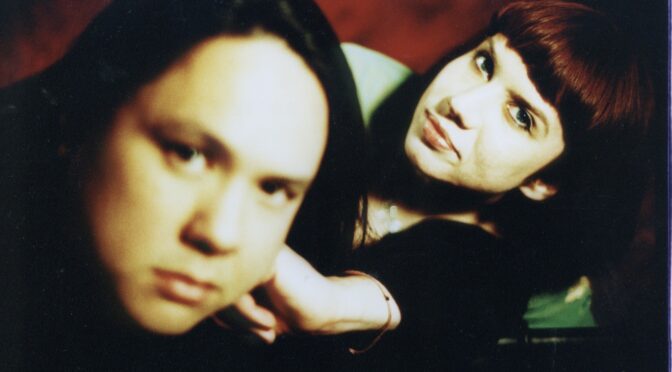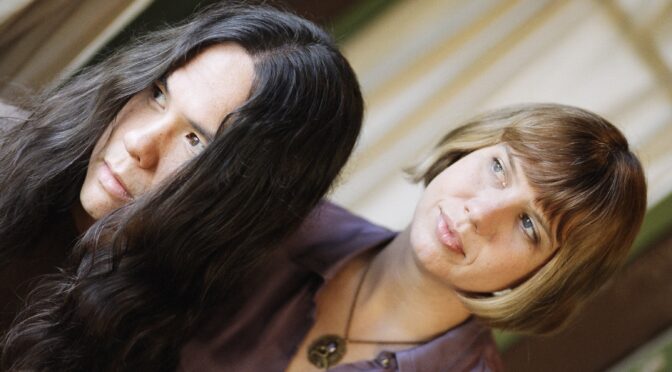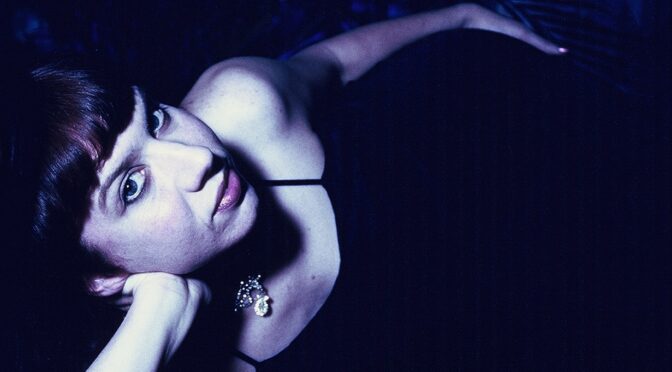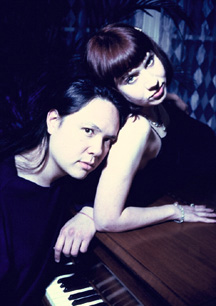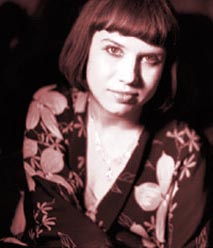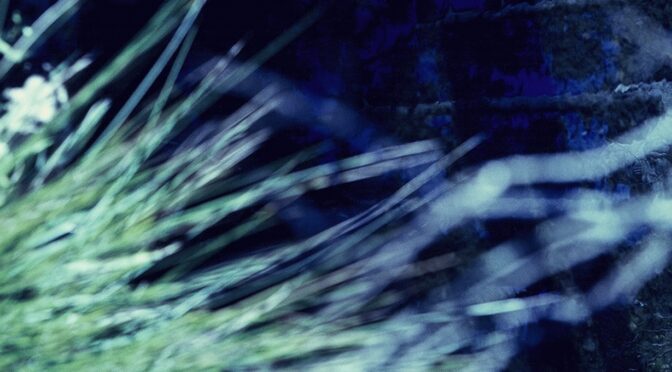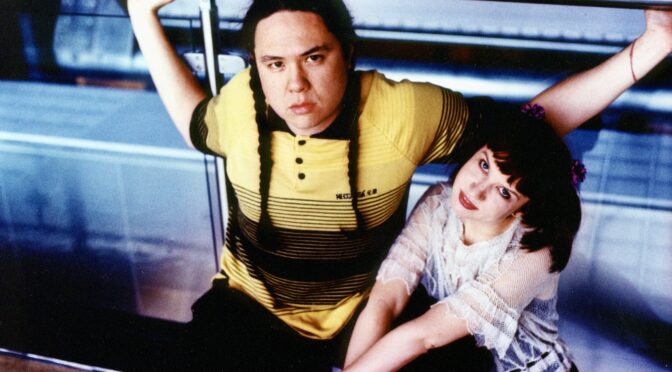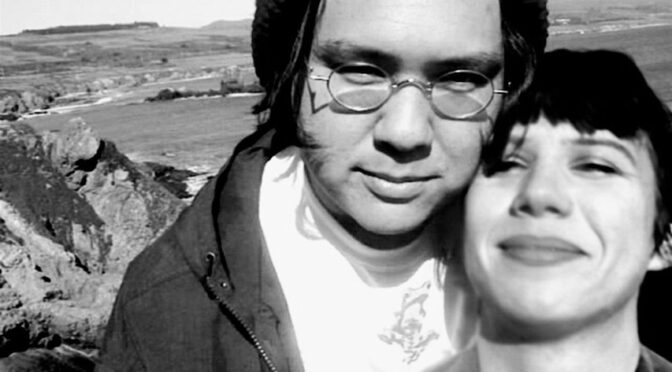Former Mp3.com CEO, Michael Robertson, just launched a new site called Mp3Tunes.com, which offers 192kbps mp3s for just 88 cents, and full albums for $8.88. Check out the site’s entries for Lovespirals and Love Spirals Downwards.
Tag Archives: Lovespirals
Stratosphere Fanzine Interview Lovespirals
Interview by Jen Stratosphere
JEN: Do you consider Lovespirals to be a continuation of Love Spirals Downwards or is it a totally separate creation?
RYAN: It’s a new band for sure. But on the other hand, I’m just doing my thing: making music. I never sat down and decided to make music in a way that wasn’t natural for me. I’m just doing what I’ve always done; making music that moves me, something that challenges me to grow musically, and something I’d want to listen to when it’s all done. With each album, I think I’ve been sucessful in being genre-less. That’s something I’ve pretty much always wanted to do; not be confined by the restrictions of making music that a certain kind of genre or following expects. I’m a free musical soul and I’ve always aimed at following my musical bliss. So older fans that got that from my music should still be just as pleased, if not more so, with Lovespirals. But if you liked my older music because you were a fan of the record label and their narrow genre and style, then you probably never really got what my music was about and won’t necessarily be into Lovespirals.
ANJI: This is a complicated question. You can look at it in different ways. Sam Rosenthal said that Lovespirals are to Love Spirals Downwards what Jefferson Starship are to Jefferson Airplane, or Pink Floyd are to The Pink Floyd Sound. In each case, a band member left and the name was shortened. Is it still the same band? Then again, Love Spirals Downwards were never really a band, per se, but a recording project headed up by Ryan. Of course, we don’t perform his old songs live, which fans would probably expect if they thought of us as being the “continuation of Love Spirals Downwards.”
Continue reading Stratosphere Fanzine Interview LovespiralsFiber Online Interviews Lovespirals
Interview by Isobel Geo for Fiber Online, Oct 26, 2003
ISOBEL: What changed in the Lovespirals sounds with your entrance in 1999?
ANJI: The sound was already evolving in 1998, moving towards something more jazzy and funky than previously. Ryan was working with Doron Orenstein, a trained jazz saxophonist, when I joined. Adding my jazzy and soulful vocals helped to further that evolution. As we continued to work together, my song writing style brought a more poppy edge to the music. The biggest change I brought to the band was that I encouraged a collaborative song writing technique, which had been lacking in the band up to that time.
ISOBEL: The last album was Windblown Kiss released last year, so what’s the new Lovespirals’ plans for albums, tours, or remixes?
ANJI: We’ve been writing and recording new songs ever since we finished touring for Windblown Kiss, and are about half way done with an album now. Soon we need to start preparing a new live set that includes all of these new songs. Right now we are getting together files for a remix competition using our new song “Walk Away” that PeaceLoveProductions will be putting on. We are currently seeking a label to release our next album, as well as looking into possibly doing them ourselves.
ISOBEL: Anji, and your project, Plastic Chair, how’s that going?
ANJI: Plastic Chair are going to have a track or two included on an upcoming Monolog Recordings compilation. Chuki has been searching for labels to release our first full length album, but I don’t think he’s settled on any one yet.
ISOBEL: In your opinion will new jazz be the future of electronic music?
ANJI: It seems to me that NuJazz has already been a fairly strong force in electronic music since the mid to late 90’s, though I suppose that has mainly been a UK thing. It always seems to take a few years until America catches up with them, so maybe it hasn’t really even begun here yet. What I’ve been hearing lately, though, is an insurgence of 80’s ElectroBoogie/ElectroFunk styles hitting the US labels that were previously doing Jazz/Soul/Funk inspired Electronica.
ISOBEL: Does Lovespirals has a brazilian bossa nova influence? Tom Jobim, Vincius de Moraes, Astrud Gilberto?
ANJI: I love Bossa Nova and was trying to influence Ryan to make an Astrud Gilberto type song for me to sing, but it came out a little differently… The song was “Our Nights.”
ISOBEL: Nowadays, what’s the strongest influence in the band’s sounds?
ANJI: As always, Ryan’s influenced by whatever music he’s listening to. For instance, during the writing of Windblown Kiss, he was listening a lot to Led Zeppelin, Pat Metheny, and Miles Davis. His music picked up some Jazz and Blues elements, yet we hardly sound like any of those artists. Lately he’s been listening a lot to Pink Floyd and Talk Talk. Of course, Ryan prefers to listen to music when he can focus all of his attention on it, so that isn’t very often. He likes to absorb albums slowly. I, on the other hand, tend to consume music. I’ve been listening to all kinds of stuff, but mainly music with very soulful vocals, from the 1970’s to now. Strangely, Ryan cites long boarding as being a big influence right now in his musical thinking.
ISOBEL: Are you very critical about another electronic music styles and hypes?
ANJI: I suppose we are both fairly critical of music. I think we are most critical of bands that don’t change over time, but seem to be stuck in one type of rut. We both enjoy a wide range of musical styles, including various electronic styles, rock, pop, and jazz.
ISOBEL: And are you critical about your own work?
ANJI: Sure, we’re totally critical of our work. We constantly seek to improve our skills and learn more about music. We never want to do the same thing twice, really.
ISOBEL: Who writes the songs, you or Ryan, or both? What subject always has taken in lyrics?
ANJI: We completely collaborate on all our songs. Ryan does the bulk of the music writing and performing, with input from me — particularly as far as the song structure goes. We work the songs up together, starting with either a guitar melody and vocal, or a keyboard melody and vocals. I write all of the lyrics and vocal melodies. My lyrics are generally about personal experiences, though sometimes they are imaginary. I like to write about love, primarily, but I also write about other subject matter.
ISOBEL: How can I describe Lovespirals?
ANJI: We’ve been referring to ourselves as Jazzy Electro-Acoustic Dance & Pop. That kind of covers it all. Our music is a mixture of Jazz, Soul, Blues, and Electronica with plenty of mood and melody. Sensual female vocals and beautiful guitar drive the songs, with funky keyboards and organic percussion keeping the rhythm. We’re currently dabbling in genres including Down Tempo, Deep House, NuJazz, and NuSoul, but we’ve also written in many other styles in the past, including Atmospheric Drum n Bass, Lounge, Folk Rock and more. We’re all over the board!
You can read Isobel’s Portuguese article at FiberOnline.com.
Reflektionen Interviews Anji of Lovespirals
Anji Bee was interviewed by Sterben von Todsleben for Reflektionen, February 2003
STERBEN: The gothic subculture seemed to be quite fond of Love Spirals Downwards; have you noticed much backlash from them with your first Lovespirals release? Does it matter what the gothic subculture thinks?
ANJI: Surprising little, actually. Before the album came out, there were a few people on our message board making a tiny squabble, but at least one of those has turned into a hard core fan since seeing us play live and buying the album. And the reviews have been overwhelmingly positive, even from Gothic sources. We didn’t really expect the kind of support we’ve received, but are happy to have it. What’s more exciting, however, is when fans of Gothic music express interest in our decidedly not-Gothic songs, many of which are available as mp3s at various sites on the Internet. Ultimately, though, we would prefer to secure a new audience for ourselves, rather than appealing to old fans of Love Spirals Downwards or Projekt Records.
STERBEN: Did you feel that there was something to prove by releasing Windblown Kiss? Was there internal or external pressure to do something removed from the traditional Love Spirals fare?
ANJI: Honestly, we were just having fun as we recorded the songs that became Windblown Kiss. We knew that what we were doing was quite different from what the two of us had done before (which was electronic dance music), but we thought some of what we were doing was fairly similar to things LSD had done before — such as “Dejame” and “Swollen Sea.” I wouldn’t say that we were trying to prove anything; we were merely trying to produce an album that wouldn’t be totally out of Projekt’s ballpark, yet was still interesting for us to create.
STERBEN: Having the album out now, and being able to hear all the reviews and comments from fans, do you look at the album and go… “Jeez we should have done this differently”?
ANJI: I guess sometimes I wish we hadn’t decided to not include songs like “Sandcastles” or “Love Survives” on the album, because it would have shown that we’re still working in electronic styles. Still, there’s a sort of Old-Timey mood that suffuses the album with these more organic rock, folk, blues and jazz pieces, and I like that. But, you know, its not like I’ve heard a single person complain that we didn’t do any electronic songs on the album.
STERBEN: Why was the decision made to include some text in languages outside of English on Windblown Kiss? Was it difficult? Could you see creating songs in the future with more language dynamics?
ANJI: Hmm… there’s kind of 2 sides to this story, I guess. On the one hand, it just kind of happened, but on the other, I suppose I was conscious of the fact that LSD had been known — rightly or not — as a multi-lingual band. I had written the poem that became “Windblown Kiss” a year or more before, and afterwards thought, “Gee, this could make a good lyric. It seems like something Ryan would work with!” But the first song we recorded in another language was actually “Dejame.” Those lyrics began with a quote from Anais Nin’s journal, and then blossomed out from there. I was inspired by the Latin flavor of the music to create Spanish lyrics; simple as that. The French part in “I Can’t See You” was just a little joke. I thought it would be cheeky to sing the last phrase in French, like some kind of late 50’s jazzy lounge singer. Those were the hardest lyrics to write, because I am not at all familiar with French. “Windblown Kiss” was the easiest, because I worked on that with a friend in Germany. I probably will do more stuff in other languages, just because it’s kind of fun. I’ve already done some work in Japanese with my friend Chukimai, for our band Plastic Chair.
STERBEN: How has the playing live experience been so far?
ANJI: Playing live has been a great experience for us. Practicing and performing has given us both the opportunity to hone our respective skills. I learned a lot about my voice in the process, and Ryan has grown much more comfortable with soloing. When he was working as LSD, he didn’t play electric guitar live, so this is a totally new thing for him! I think working with effects on stage has been an interesting challenge, as well as figuring out how to switch from rhythm guitar parts to solos and then back again.
STERBEN: Is their a distinct Lovespirals frame of mind? Are you always you, or is their a definite Lovespirals mindset?
ANJI: Ryan’s talked in the past about having to put on a “Lovespirals hat” when he goes out as a performer, but I haven’t experienced anything like that. I’m always just me, more or less. I prefer to approach the fans as friends, if at all possible. I guess it’s a bit odd when you’re surrounded by folks asking for autographs and photos, but I don’t really act or even feel differently in that situation.
STERBEN: If you could live in any time period, which would it be? What about that period of time draws you there? Do you think you’d still be making music?
ANJI: I’ve always been fascinated by the “Roaring 20’s.” I love late 20’s fashions, hairdos, art and design, architecture, and even music. I simply adore old syncopated jazz and gutbucket blues tunes! I’d definitely be one of those daring flapper girls who snuck off to black jazz clubs to dance and sing, rather than sticking around with the stuffy white folks who had no sense of rhythm or soul.
STERBEN: What should fans look forward to seeing in the next release from Lovespirals?
ANJI: I honestly don’t know what’s up for future Lovespirals releases. We have a number of electronic songs in the works, very different from both the Windblown Kiss or Ecstatic EP tunes, so we’ll have to see where we go from here.
For the full interview, please see reflektionen.net
Chain DLK Webzine Interviews Anji Bee
August 2002, Chain DLK Webzine, Shaun Hamilton
SHAUN: How did you two meet and start working on music together?
ANJI: We met a few times at different places in Los Angeles. We first started talking at a little Projekt Records party that both our bands were invited to. Then we got to know each other more through a series of appearances he made on KUCI, for both my radio show and other DJs’ shows. One afternoon he had me come over to his studio and he showed me a few new songs he was working on. One of those became the instrumental, ‘Beatitude,’ and the other eventually turned into ‘Love Survives.’
The first song he had me do vocals on was the club track, ‘Ecstatic,’ which just has a little ‘oooh ahhh’ sample. Our first song that came out on CD was a remix of “Bittersweet” for Claire Voyant, in late 1999, early 2000, I forget exactly. 1999-2000 was a very transitional time’ We weren’t totally sure where we were headed yet. Ryan was still very immersed in the DJ scene then, so the tunes we were working on were all 10-minute dance tracks — pretty unsuitable as album material. It wasn’t really until 2001 that things clicked into place for us, as far as the album goes.
SHAUN: Have you or Ryan had jazz training, and what are your musical backgrounds?
ANJI: No, neither of us has had any Jazz schooling. Our sax player, Doron, actually does have a degree in Jazz, though! Ryan’s been reading up on Jazz the last year or so. He used to joke that he’d become a Jazz guitarist after he played a year in the NBA, but now he’s already accomplished the former without getting much closer to the latter goal’ (Ha ha!) Both Ryan and I had a few lessons when we were young, but we’re mostly self-taught. He’s been playing guitar for most of his life. I think listening to a wide range of good music, and studying it to find out what makes it work, has been our best training.
SHAUN: Your work seems to revolve around the subject of love. What is your opinion on the state of love in today’s world?
ANJI: I believe that love is the most important thing in the world. Certainly nothing great can be accomplished without love as a motivating factor. Everyone is searching for love, in one way or another, and many are finding unsatisfactory substitutes in our modern world. I don’t think we can ever feel truly whole until we surrender to love ‘ not only love for another person, but for ourselves, and for the world around us, as well.
SHAUN: Any words of advice?
ANJI: Never doubt your ability to grow and improve as a human being. Don’t let negative people get you down. Pursue your dreams and live your life with joy!
Excerpt from the full interview hosted at the ChainDLK site.
Anji Bee featured on Mp3.com
Mp3.com is currently featuring Anji on their popular Women of Mp3.com station, as well as the Hot Artist of the Month Spotlight. Jianda Johnson recently interviewed Anji about her musical career, including both Lovespirals and side collaborations. Read — and hear — more at the following URLs:
- Women of Mp3.com
- Mp3.com Interview: Anji Bee
- Hot Artist Spotlight – Easy Listening
From MP3.com Hot Artist Spotlight (July 2002):
Anji Bees one half of the lovely yin-yang equation named Lovespirals (mp3.com/lovespirals). Though her presence and electronic collaborations are quite prominent online, oftentimes people arent fully aware of her Lovespirals connection (to Ryan Lum , other music-half), or the depth of her project involvement. Anji’s soft, seductive voice comforts, rather than crushes you, hitting your consciousness in rolling waves. Hence, her popularity with collaborations in a myriad of other projects. If you love lounge, shoegazer, down tempo, ambient, or classical music (or its variations — from subtle to razor-sharp), visit Anji — it’s a damn good trip. Sugary sweet picks: “Perfect Boy (Bitstream Dream & Anji Bee)” & “Goodbye (Bitstream Dream & Anji Bee).”
– Jianda Johnson
Chain DLK Reviews ‘Windblown Kiss’
A positive review of our debut full-length album has appeared in Chain DLK, ” your #1 source for electronic, industrial, ambient & dark experiments music.” It reads, in part:
With the new group, new influences have come through, with a strong jazz element. To think of it, this is like Billy Holiday with better vocals and more of a mood! “Oh So Long” starts off with a sensual horn section and Anji Bee’s masterful ethereal vocals, which go for mood and emotion, not a high pitch like a lot of ethereal vocalists. She reminds me alot of the girl from Portishead a bit, but softer. As good as Suzanne Perry was, Anji Bee has her matched. The rest of the album flows with a very controlled calm, very laid back and sensual. A welcome shift of direction, and should please fans of both jazz, ethereal, and emotional folk music. And if you’re looking for that CD for you and your lover to listen to under some candlelight, this is it!Very recommended.
9/10 KlingKlangBedlam
Read the full review here.
The Women of Mp3.com Interview
Jianda Johnson interviews Anji for a feature article on the Women of Mp3.com Station.
JIANDA: How did you get into music, how long have you been making it, and when did you join Lovespirals?
ANJI: I’d say that I first got into music through my dad. One of my earliest memories is circling around the coffee table to “Here Comes the Sun,” when I was barely able to walk. I started singing very early, doing school productions from Pre-School on. Shortly out of High School, I got invovled with different garage bands, doing gigs, and recording 4 track demos. Strangely, I really always wanted to be a guitarist, but I’ve just never been very adept at it! I did play guitar in an industrial noise rock band for awhile, but it was a struggle for me. I played percussion in another band around that time too. It’s funny to think about those old bands now, in comparison to my work with Lovespirals. Speaking of Lovespirals, I began working with Ryan in early 1999.
JIANDA: Can you please explain the difference between Lovespirals and Love Spirals Downwards?
ANJI: When Ryan and I began working back in 1999 on Drum ‘n’ Bass tunes, he was in a transitional period, unsure if he wanted to make another listening album or start releasing 12’s instead. At that time, we weren’t sure if our stuff was going to be released as Love Spirals Downwards or as some kind of side project. We were just recording songs and pressing dubplates for him to spin in his DJ sets, not sending them around to labels or trying to get them released. Then I made those tracks available online through mp3.com and folks started contacting us to include stuff on compilations, so by now all of them have been released somewhere or other, which is really cool. But I digress… It’s tremendously hard to explain exactly where or how things changed between Love Spirals Downwards and Lovespirals, because it was all just a natural progression.
Continue reading The Women of Mp3.com InterviewJive Magazine Interview & New Song
Russ Marshall of Jive interviewed Ryan and Anji for the music section of their print magazine. Their website also features the Lovespirals interview plus an mp3 of the brand new unreleased song, “Love Survives.” Be sure to check that out at www.jivemagazine.com and if you can pick up a copy of the magazine, snatch it up now!
Q: When did the Ryan/Anji collaborations begin, and how did that come to be?
Anji: Ryan and I started working together late 1998, early 1999. We pretty much hooked up through my radio show on KUCI 88.9fm (in Irvine, CA). He had me come over to his studio to check out some new stuff he was working on (which later turned out to be ‘Beatitude’ and ‘Love Survives’) and I was really into it. The first two songs we did, “Ecstatic” and “Hand in Hand,’ Ryan made dub plates of; he was more heavily into deejaying at that time.
MacNETv2 Interviews Lovespirals
MacNETv2, a fansite for Mac users, just posted an interview with Ryan and Anji discussing their use of Macs in music, design, and website creation. We’ll include some excerpts below:
Interview by Chris Volpe
Chris: Why the Mac platform and not Windows?
Ryan: Actually, we do have one Windows machine, a Compaq, that we use as the server for the studio and house. I’m interested in getting Mac OSX server one day, but I don’t have a spare Mac that I can use as a server right now. But back to your question, there are many reasons why we use Macs. The biggest one is that I enjoy working on them. When there is a problem, I can most often figure out what’s wrong and fix it myself, while PCs seem more complicated in that regard. I like the plug and play ease of use that Macs have. There’s nothing worse than trying for hours and days to get hardware working. Plus, Apple continues to create the most innovative products. If I had enough money, I’d go out today and buy the new flat panel G4 iMac for the office, an iBook for lighter work and playing games, a Titanium PowerBook for doing live shows, and a 1 ghz G4 to run a ton of audio plug ins in my studio. I can’t say that I want to rush out there and buy a copy of Windows XP.
Chris:: Do Macs enhance your creativity in any way?
Ryan: I don’t know if Macs make me more creative, but as far as computers go, they’re the least obtrusive in letting me get on with my creative work in the studio without being forced into thinking like a computer. You just point, click, drag, and don’t have to worry about anything else with regards to the computer. I see computers as a tool, a tool you use to get things done. I think Macs are by far the best platform for anyone who does music or graphics. Also for getting photos, mp3s, and video into and out of your computer, nothing can compete with Macs and all the new Apple software like iTunes, iMovie, and iPhoto. But if you’re a more nerdy C++ or ASP programmer, I’d say PCs are the way to go and a Mac wouldn’t be the right tool at all.
Continue reading MacNETv2 Interviews LovespiralsLSD RadioSpy Interview Feature
March 17, 2000 RadioSpy Interview by Sean Flinn:
“Indie goths gone electronic, LSD’s sound now sketches its past while tracing its future.”
“We’re the first and only for a lot of things on Projekt,” says Ryan Lum, the multi-instrumentalist and driving force behind Love Spirals Downwards, darkwave label Projekt Record’s top-selling act. Lum is sipping on a soda in a RadioSpy conference room and choosing his words carefully. He’s speaking of his band’s use of saxophone riffs on a song from its latest release, Temporal, a career retrospective that includes a number of unreleased tracks. Lum was concerned that Sam Rosenthal, Projekt Record’s sometimes finicky founder, might be less than enthusiastic about the sax track.
“[Rosenthal] actually made a positive comment about the saxophone. He said, ‘You know, it fits somehow,” recounts Anji Bee, Ryan’s self-described “partner-in-crime” and recent collaborator on everything from album art to vocals. Lum’s experimentation — with his sound and with the band’s direction — initially met with grudging acceptance from Rosenthal, who eventually warmed to the band’s new sound.
“It’s not his cup of tea,” Lum says of Rosenthal’s reaction to the band’s shift in sound from “shoegazer,” the ethereal style of feedback- and synth-drenched pop defined by British bands like My Bloody Valentine, Slowdive and the Cocteau Twins, to drum ‘n’ bass. “But we more or less have artistic freedom to do as we please. I guess being the top seller on the label doesn’t hurt us in that,” Lum says with a chuckle.
Continue reading LSD RadioSpy Interview Feature
